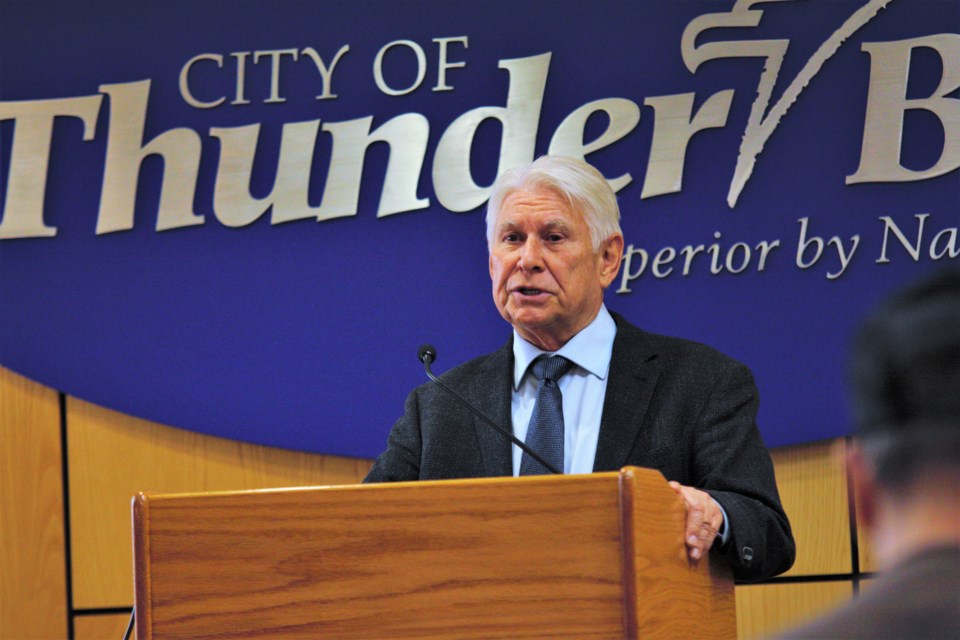THUNDER BAY – It’s a time-limited chance to put the municipality’s concerns front and centre with provincial ministers who will likely hold sway over whether the city get its way.
And members of Thunder Bay’s delegation to the 2023 Rural Ontario Municipal Association (ROMA) conference say they’re ready to make the most of the opportunity.
Mayor Ken Boshcoff will join fellow members of the city's intergovernmental affairs committee Couns. Shelby Ch’ng and Kristen Oliver at the event, held in person for the first time in two years in Toronto from Sunday to Tuesday, with over 1,000 municipal leaders expected to attend.
In addition to lobbying sessions with ministers, the conference offers workshops on topics like asset management, attracting housing development, and a looming blue box transition.
Oliver, who chairs the intergovernmental affairs committee, said one of the city’s first priorities is a meeting with Associate Minister of Mental Health and Addictions Michael Tibollo, in which the delegation will renew calls to fund a mental health and addictions crisis centre in the city.
Backed by dozens of local health organizations, the proposal for a 40-bed centre has sat with Tibollo’s office since 2020 without gaining approval.
Leaders say the centre is a desperately-needed response to an addictions crisis that's hit Thunder Bay particularly hard, with the district's rate of opioid-related deaths more than four times the provincial average.
City council underscored the depth of the situation in a vote earlier this week, endorsing calls to decriminalize simple drug possession, boost funding for harm reduction programs, and declare a provincial emergency over the overdose crisis.
It's far from the first time local leaders have pushed the province on the issue, Oliver acknowledged.
“The minister is very well aware of what’s happening here – we've had these discussions with the minister a number of times. But I think we’re starting to see how the social crisis is growing outside of Thunder Bay and in Northwestern Ontario. I know Kenora and Dryden, Fort Frances, Sioux Lookout – they’re all having very similar discussions.”
That, along with determined community advocacy, has helped put addiction and mental health issues on the government’s radar, she believes, expressing optimism that could drive forward motion.
“I think we will likely see some movement on this file, just from what I’m gleaning from some of the conversations we’re having – not to mention the advocacy of the parents [of drug poisoning victims] who are coming out and applying a lot of pressure,” Oliver said. “They've already made some great inroads with ministers’ staff and ministers themselves.”
Other top lobbying items include safety improvements to the Thunder Bay Expressway and future plans for the Northwest Arterial, and highlighting the city’s NOHFC applications, including some relating to Fort William Stadium and the Pool 6 grounds, said Oliver.
“It’s a great opportunity for us to have these discussions with ministers,” she said. “I’m often jealous of my colleagues in Southern Ontario who can just hop on a GO Train and go to Queen’s Park whenever. For us to go, it certainly requires a little bit more planning and attention to get there, but it’s incredibly valuable.”
Boshcoff said he’s most focused on bringing attention to the need for additional provincial support, leaning on an argument that Thunder Bay’s population may dramatically undercounted, which has been bolstered by researchers.
“Our goal is to touch the bases that affect Thunder Bay the most – that is our regional problems we have now trying to service so many people coming into the city, the emergency services, the pressure on all the policing and special teams that are affecting our health care,” the mayor said in a recent interview.
Boshcoff wondered aloud whether the conference is the most effective venue for advocacy, however.
“I want to change the whole format about how we lobby the ministers,” he said. “Going in, seeing them for seven minutes and there’s 25 other municipalities after you every day... Maybe we should change the channel and save a couple thousand dollars, go down to Queen’s Park and go see everybody on their terms, and then just have lots of time with them.”
